Analysis of AI's Impact on Organizational Decision Making at Unilever
VerifiedAdded on 2023/01/05
|27
|5677
|25
Report
AI Summary
This report examines the impact of Artificial Intelligence (AI) on organizational decision-making, specifically focusing on Unilever. The report begins with an introduction to AI and its applications in business, including data analysis, automation, and customer engagement. It then outlines the research objectives, which include understanding AI in an organizational context, examining its benefits to Unilever, and determining its impact on decision-making processes. The literature review explores AI's role in organizations, the advantages it offers to Unilever (such as personalized shopping experiences, data mining, and automated customer interactions), and its influence on decision-making through automation of tasks, consumer behavior prediction, and the use of decision support systems. The methodology section details the research philosophy, approach, choice, strategy, data collection methods (primary and secondary), and sampling techniques employed. Finally, the report concludes with a critical appraisal, recommendations, and suggestions for future research, offering insights into how AI is reshaping Unilever's strategic and operational decisions.
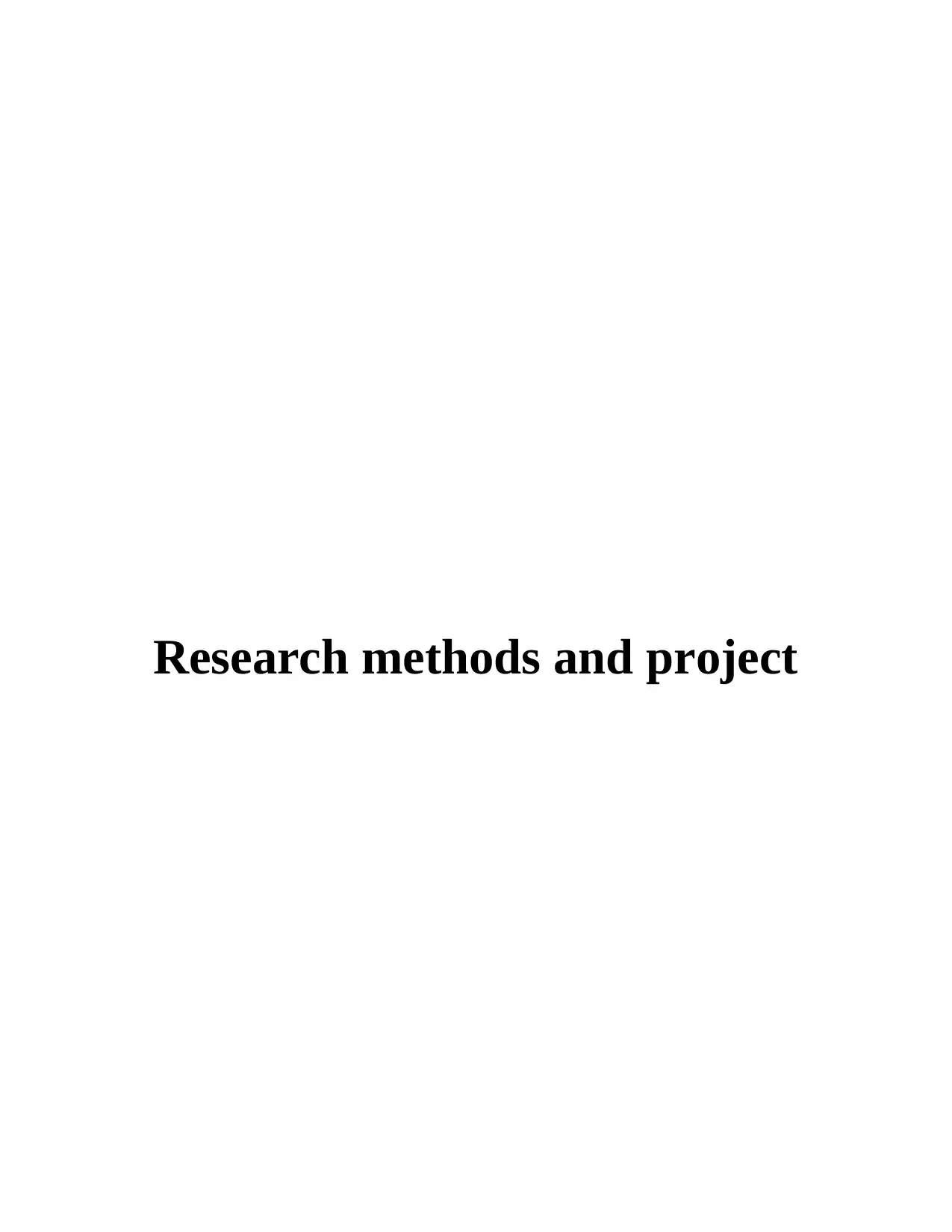
Research methods and project
Paraphrase This Document
Need a fresh take? Get an instant paraphrase of this document with our AI Paraphraser
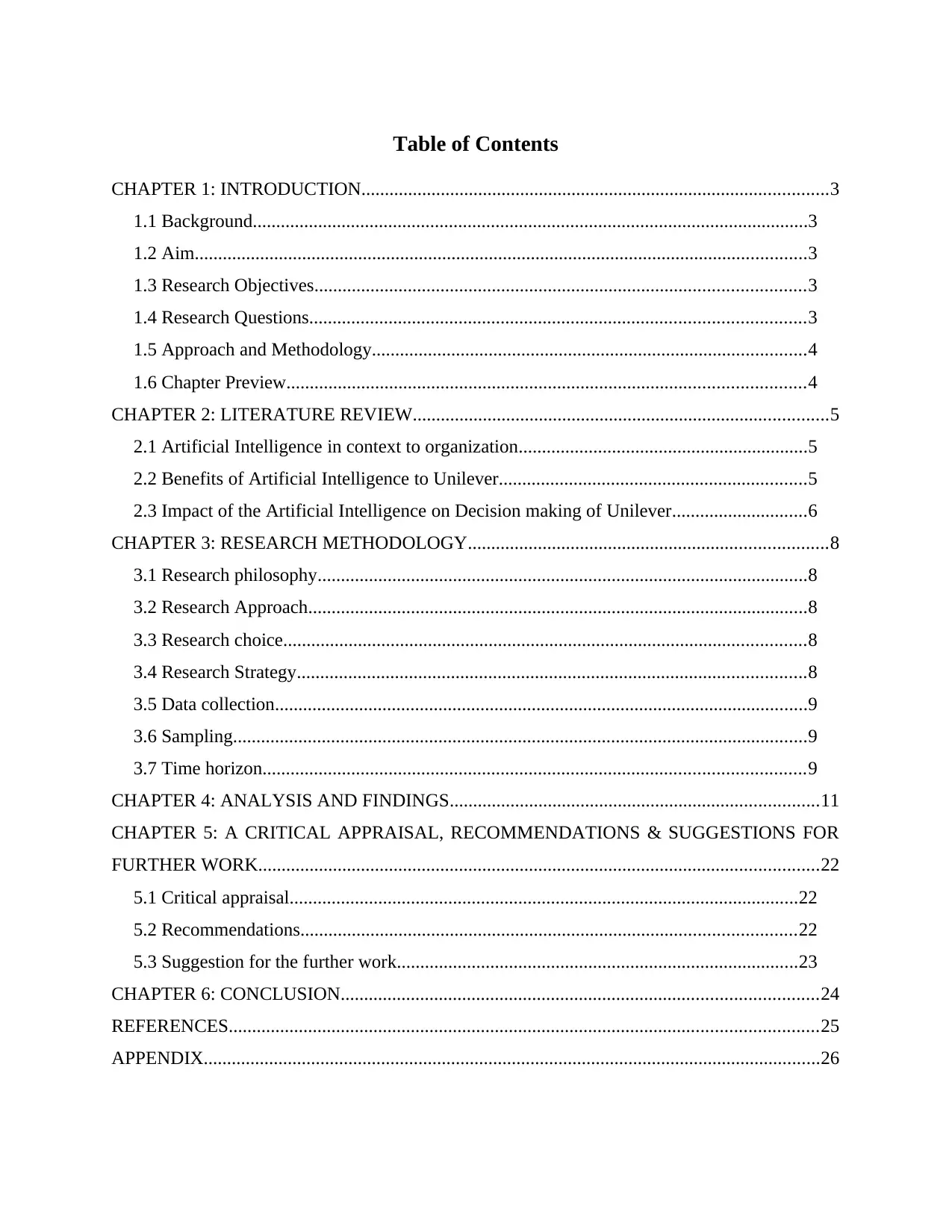
Table of Contents
CHAPTER 1: INTRODUCTION....................................................................................................3
1.1 Background.......................................................................................................................3
1.2 Aim...................................................................................................................................3
1.3 Research Objectives.........................................................................................................3
1.4 Research Questions..........................................................................................................3
1.5 Approach and Methodology.............................................................................................4
1.6 Chapter Preview...............................................................................................................4
CHAPTER 2: LITERATURE REVIEW.........................................................................................5
2.1 Artificial Intelligence in context to organization..............................................................5
2.2 Benefits of Artificial Intelligence to Unilever..................................................................5
2.3 Impact of the Artificial Intelligence on Decision making of Unilever.............................6
CHAPTER 3: RESEARCH METHODOLOGY.............................................................................8
3.1 Research philosophy.........................................................................................................8
3.2 Research Approach...........................................................................................................8
3.3 Research choice................................................................................................................8
3.4 Research Strategy.............................................................................................................8
3.5 Data collection..................................................................................................................9
3.6 Sampling...........................................................................................................................9
3.7 Time horizon....................................................................................................................9
CHAPTER 4: ANALYSIS AND FINDINGS...............................................................................11
CHAPTER 5: A CRITICAL APPRAISAL, RECOMMENDATIONS & SUGGESTIONS FOR
FURTHER WORK........................................................................................................................22
5.1 Critical appraisal.............................................................................................................22
5.2 Recommendations..........................................................................................................22
5.3 Suggestion for the further work......................................................................................23
CHAPTER 6: CONCLUSION......................................................................................................24
REFERENCES..............................................................................................................................25
APPENDIX....................................................................................................................................26
CHAPTER 1: INTRODUCTION....................................................................................................3
1.1 Background.......................................................................................................................3
1.2 Aim...................................................................................................................................3
1.3 Research Objectives.........................................................................................................3
1.4 Research Questions..........................................................................................................3
1.5 Approach and Methodology.............................................................................................4
1.6 Chapter Preview...............................................................................................................4
CHAPTER 2: LITERATURE REVIEW.........................................................................................5
2.1 Artificial Intelligence in context to organization..............................................................5
2.2 Benefits of Artificial Intelligence to Unilever..................................................................5
2.3 Impact of the Artificial Intelligence on Decision making of Unilever.............................6
CHAPTER 3: RESEARCH METHODOLOGY.............................................................................8
3.1 Research philosophy.........................................................................................................8
3.2 Research Approach...........................................................................................................8
3.3 Research choice................................................................................................................8
3.4 Research Strategy.............................................................................................................8
3.5 Data collection..................................................................................................................9
3.6 Sampling...........................................................................................................................9
3.7 Time horizon....................................................................................................................9
CHAPTER 4: ANALYSIS AND FINDINGS...............................................................................11
CHAPTER 5: A CRITICAL APPRAISAL, RECOMMENDATIONS & SUGGESTIONS FOR
FURTHER WORK........................................................................................................................22
5.1 Critical appraisal.............................................................................................................22
5.2 Recommendations..........................................................................................................22
5.3 Suggestion for the further work......................................................................................23
CHAPTER 6: CONCLUSION......................................................................................................24
REFERENCES..............................................................................................................................25
APPENDIX....................................................................................................................................26
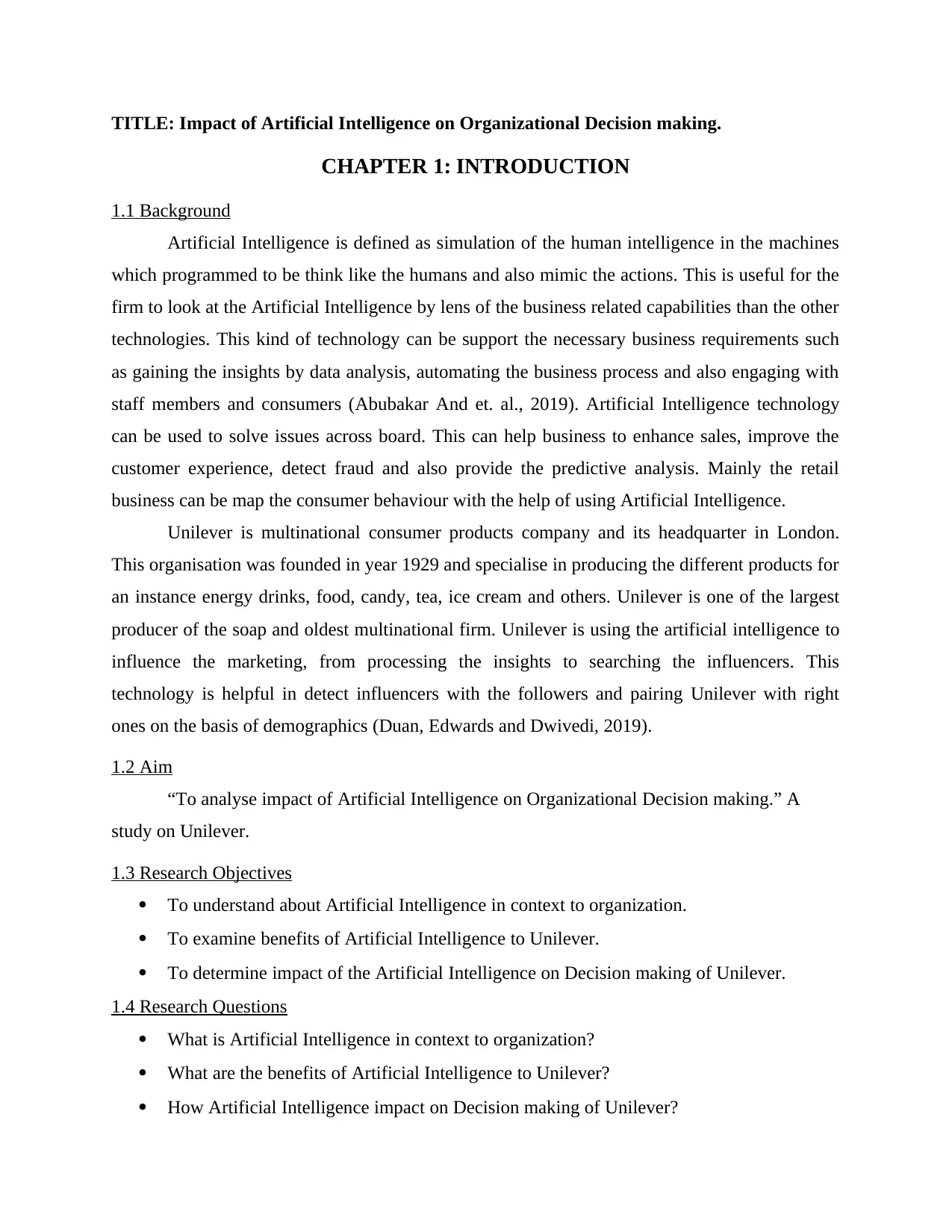
TITLE: Impact of Artificial Intelligence on Organizational Decision making.
CHAPTER 1: INTRODUCTION
1.1 Background
Artificial Intelligence is defined as simulation of the human intelligence in the machines
which programmed to be think like the humans and also mimic the actions. This is useful for the
firm to look at the Artificial Intelligence by lens of the business related capabilities than the other
technologies. This kind of technology can be support the necessary business requirements such
as gaining the insights by data analysis, automating the business process and also engaging with
staff members and consumers (Abubakar And et. al., 2019). Artificial Intelligence technology
can be used to solve issues across board. This can help business to enhance sales, improve the
customer experience, detect fraud and also provide the predictive analysis. Mainly the retail
business can be map the consumer behaviour with the help of using Artificial Intelligence.
Unilever is multinational consumer products company and its headquarter in London.
This organisation was founded in year 1929 and specialise in producing the different products for
an instance energy drinks, food, candy, tea, ice cream and others. Unilever is one of the largest
producer of the soap and oldest multinational firm. Unilever is using the artificial intelligence to
influence the marketing, from processing the insights to searching the influencers. This
technology is helpful in detect influencers with the followers and pairing Unilever with right
ones on the basis of demographics (Duan, Edwards and Dwivedi, 2019).
1.2 Aim
“To analyse impact of Artificial Intelligence on Organizational Decision making.” A
study on Unilever.
1.3 Research Objectives
To understand about Artificial Intelligence in context to organization.
To examine benefits of Artificial Intelligence to Unilever.
To determine impact of the Artificial Intelligence on Decision making of Unilever.
1.4 Research Questions
What is Artificial Intelligence in context to organization?
What are the benefits of Artificial Intelligence to Unilever?
How Artificial Intelligence impact on Decision making of Unilever?
CHAPTER 1: INTRODUCTION
1.1 Background
Artificial Intelligence is defined as simulation of the human intelligence in the machines
which programmed to be think like the humans and also mimic the actions. This is useful for the
firm to look at the Artificial Intelligence by lens of the business related capabilities than the other
technologies. This kind of technology can be support the necessary business requirements such
as gaining the insights by data analysis, automating the business process and also engaging with
staff members and consumers (Abubakar And et. al., 2019). Artificial Intelligence technology
can be used to solve issues across board. This can help business to enhance sales, improve the
customer experience, detect fraud and also provide the predictive analysis. Mainly the retail
business can be map the consumer behaviour with the help of using Artificial Intelligence.
Unilever is multinational consumer products company and its headquarter in London.
This organisation was founded in year 1929 and specialise in producing the different products for
an instance energy drinks, food, candy, tea, ice cream and others. Unilever is one of the largest
producer of the soap and oldest multinational firm. Unilever is using the artificial intelligence to
influence the marketing, from processing the insights to searching the influencers. This
technology is helpful in detect influencers with the followers and pairing Unilever with right
ones on the basis of demographics (Duan, Edwards and Dwivedi, 2019).
1.2 Aim
“To analyse impact of Artificial Intelligence on Organizational Decision making.” A
study on Unilever.
1.3 Research Objectives
To understand about Artificial Intelligence in context to organization.
To examine benefits of Artificial Intelligence to Unilever.
To determine impact of the Artificial Intelligence on Decision making of Unilever.
1.4 Research Questions
What is Artificial Intelligence in context to organization?
What are the benefits of Artificial Intelligence to Unilever?
How Artificial Intelligence impact on Decision making of Unilever?
⊘ This is a preview!⊘
Do you want full access?
Subscribe today to unlock all pages.

Trusted by 1+ million students worldwide
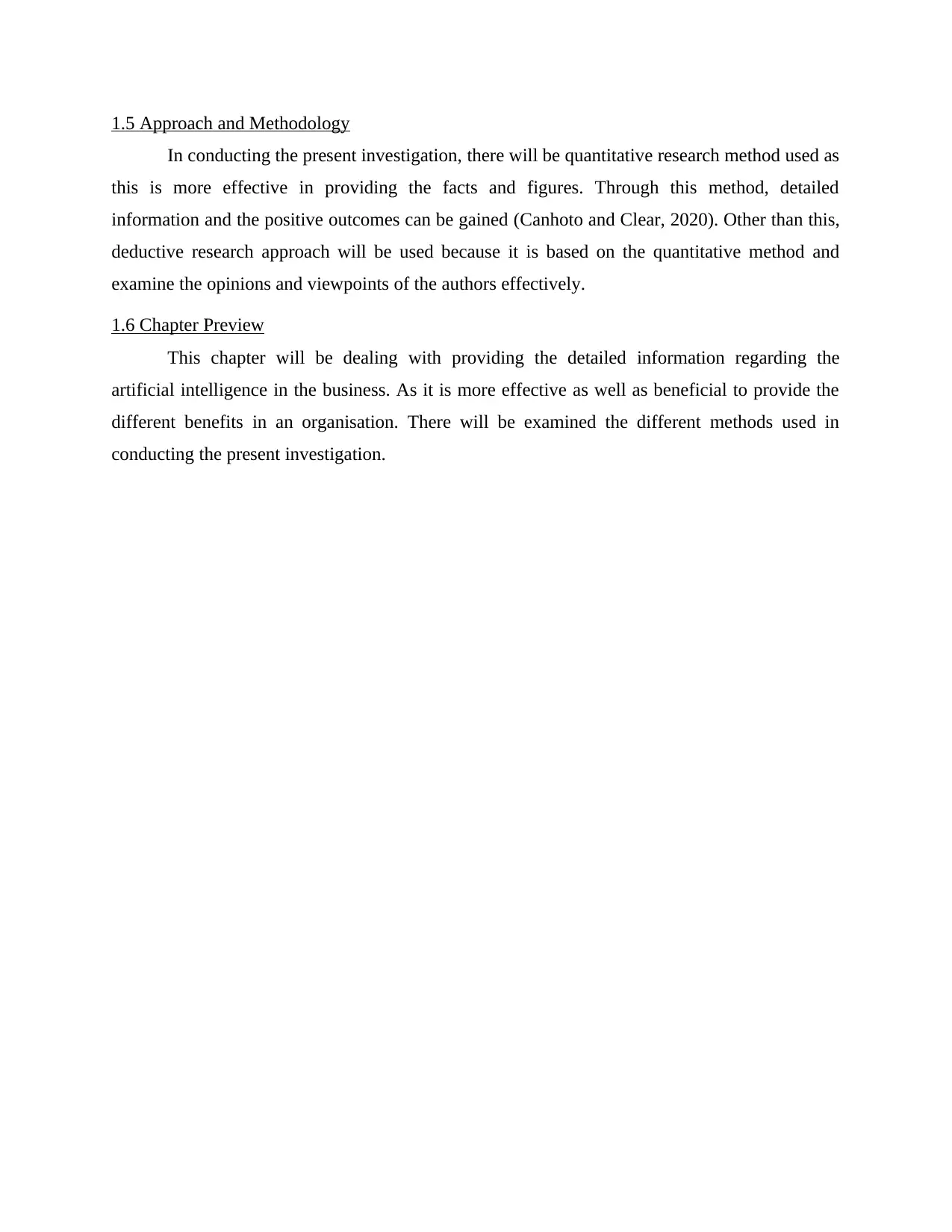
1.5 Approach and Methodology
In conducting the present investigation, there will be quantitative research method used as
this is more effective in providing the facts and figures. Through this method, detailed
information and the positive outcomes can be gained (Canhoto and Clear, 2020). Other than this,
deductive research approach will be used because it is based on the quantitative method and
examine the opinions and viewpoints of the authors effectively.
1.6 Chapter Preview
This chapter will be dealing with providing the detailed information regarding the
artificial intelligence in the business. As it is more effective as well as beneficial to provide the
different benefits in an organisation. There will be examined the different methods used in
conducting the present investigation.
In conducting the present investigation, there will be quantitative research method used as
this is more effective in providing the facts and figures. Through this method, detailed
information and the positive outcomes can be gained (Canhoto and Clear, 2020). Other than this,
deductive research approach will be used because it is based on the quantitative method and
examine the opinions and viewpoints of the authors effectively.
1.6 Chapter Preview
This chapter will be dealing with providing the detailed information regarding the
artificial intelligence in the business. As it is more effective as well as beneficial to provide the
different benefits in an organisation. There will be examined the different methods used in
conducting the present investigation.
Paraphrase This Document
Need a fresh take? Get an instant paraphrase of this document with our AI Paraphraser
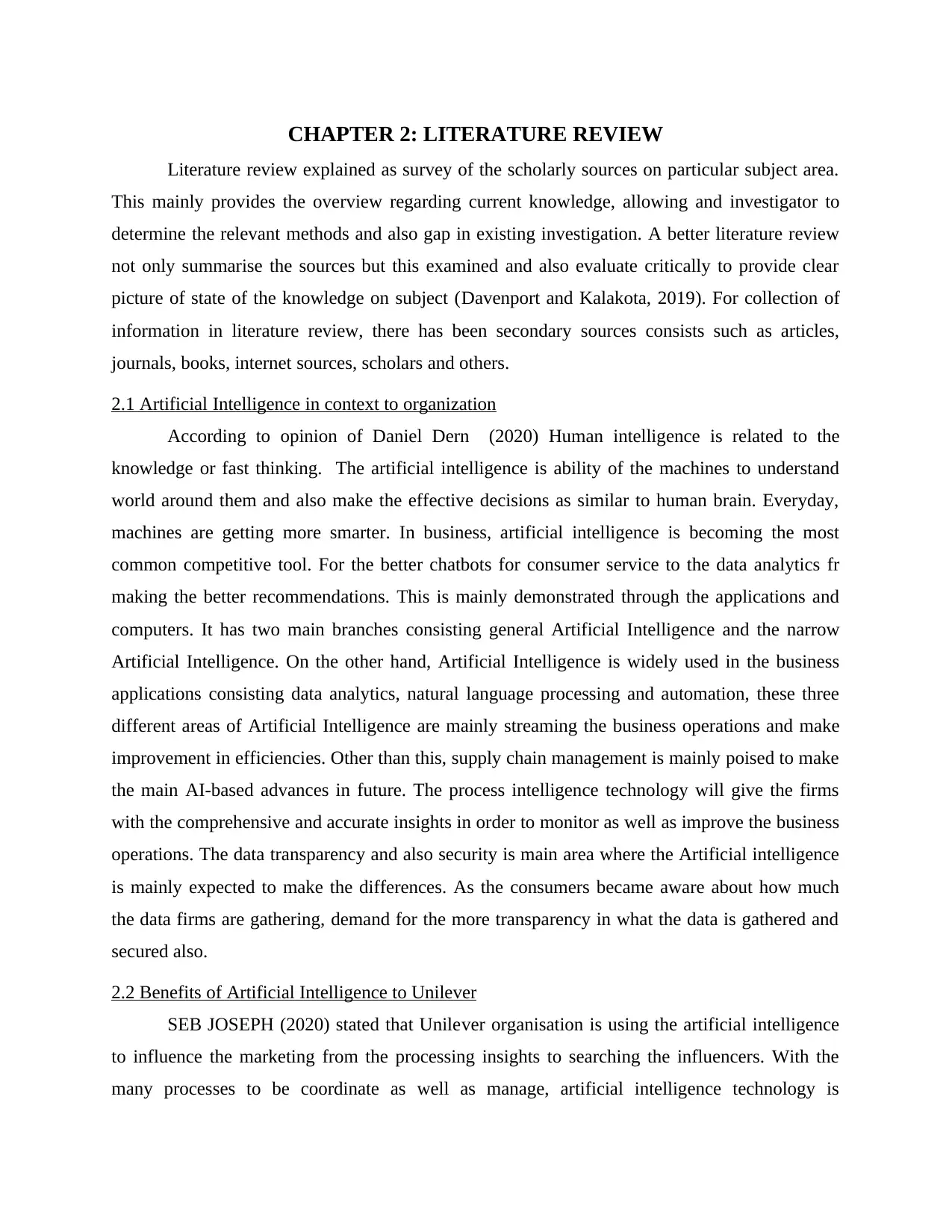
CHAPTER 2: LITERATURE REVIEW
Literature review explained as survey of the scholarly sources on particular subject area.
This mainly provides the overview regarding current knowledge, allowing and investigator to
determine the relevant methods and also gap in existing investigation. A better literature review
not only summarise the sources but this examined and also evaluate critically to provide clear
picture of state of the knowledge on subject (Davenport and Kalakota, 2019). For collection of
information in literature review, there has been secondary sources consists such as articles,
journals, books, internet sources, scholars and others.
2.1 Artificial Intelligence in context to organization
According to opinion of Daniel Dern (2020) Human intelligence is related to the
knowledge or fast thinking. The artificial intelligence is ability of the machines to understand
world around them and also make the effective decisions as similar to human brain. Everyday,
machines are getting more smarter. In business, artificial intelligence is becoming the most
common competitive tool. For the better chatbots for consumer service to the data analytics fr
making the better recommendations. This is mainly demonstrated through the applications and
computers. It has two main branches consisting general Artificial Intelligence and the narrow
Artificial Intelligence. On the other hand, Artificial Intelligence is widely used in the business
applications consisting data analytics, natural language processing and automation, these three
different areas of Artificial Intelligence are mainly streaming the business operations and make
improvement in efficiencies. Other than this, supply chain management is mainly poised to make
the main AI-based advances in future. The process intelligence technology will give the firms
with the comprehensive and accurate insights in order to monitor as well as improve the business
operations. The data transparency and also security is main area where the Artificial intelligence
is mainly expected to make the differences. As the consumers became aware about how much
the data firms are gathering, demand for the more transparency in what the data is gathered and
secured also.
2.2 Benefits of Artificial Intelligence to Unilever
SEB JOSEPH (2020) stated that Unilever organisation is using the artificial intelligence
to influence the marketing from the processing insights to searching the influencers. With the
many processes to be coordinate as well as manage, artificial intelligence technology is
Literature review explained as survey of the scholarly sources on particular subject area.
This mainly provides the overview regarding current knowledge, allowing and investigator to
determine the relevant methods and also gap in existing investigation. A better literature review
not only summarise the sources but this examined and also evaluate critically to provide clear
picture of state of the knowledge on subject (Davenport and Kalakota, 2019). For collection of
information in literature review, there has been secondary sources consists such as articles,
journals, books, internet sources, scholars and others.
2.1 Artificial Intelligence in context to organization
According to opinion of Daniel Dern (2020) Human intelligence is related to the
knowledge or fast thinking. The artificial intelligence is ability of the machines to understand
world around them and also make the effective decisions as similar to human brain. Everyday,
machines are getting more smarter. In business, artificial intelligence is becoming the most
common competitive tool. For the better chatbots for consumer service to the data analytics fr
making the better recommendations. This is mainly demonstrated through the applications and
computers. It has two main branches consisting general Artificial Intelligence and the narrow
Artificial Intelligence. On the other hand, Artificial Intelligence is widely used in the business
applications consisting data analytics, natural language processing and automation, these three
different areas of Artificial Intelligence are mainly streaming the business operations and make
improvement in efficiencies. Other than this, supply chain management is mainly poised to make
the main AI-based advances in future. The process intelligence technology will give the firms
with the comprehensive and accurate insights in order to monitor as well as improve the business
operations. The data transparency and also security is main area where the Artificial intelligence
is mainly expected to make the differences. As the consumers became aware about how much
the data firms are gathering, demand for the more transparency in what the data is gathered and
secured also.
2.2 Benefits of Artificial Intelligence to Unilever
SEB JOSEPH (2020) stated that Unilever organisation is using the artificial intelligence
to influence the marketing from the processing insights to searching the influencers. With the
many processes to be coordinate as well as manage, artificial intelligence technology is
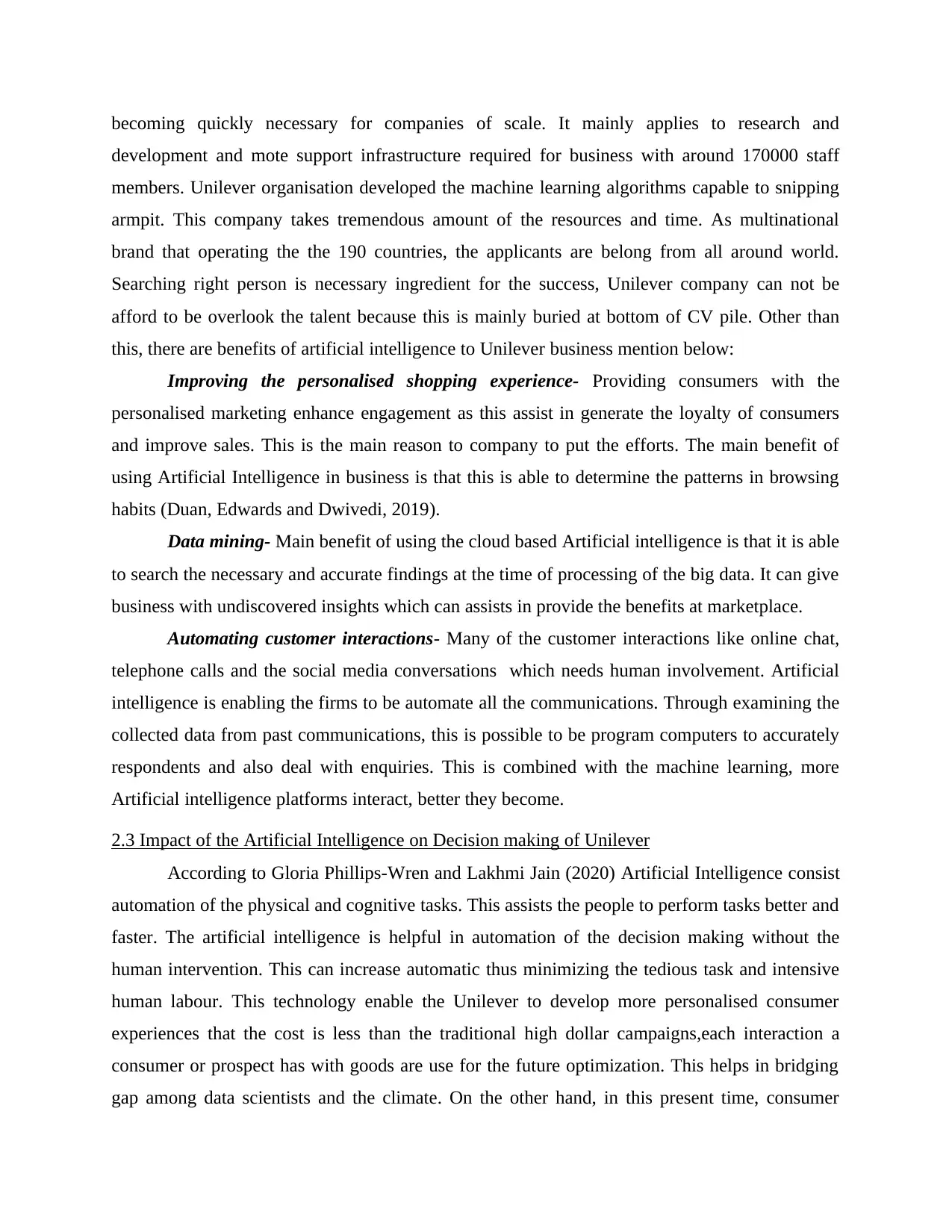
becoming quickly necessary for companies of scale. It mainly applies to research and
development and mote support infrastructure required for business with around 170000 staff
members. Unilever organisation developed the machine learning algorithms capable to snipping
armpit. This company takes tremendous amount of the resources and time. As multinational
brand that operating the the 190 countries, the applicants are belong from all around world.
Searching right person is necessary ingredient for the success, Unilever company can not be
afford to be overlook the talent because this is mainly buried at bottom of CV pile. Other than
this, there are benefits of artificial intelligence to Unilever business mention below:
Improving the personalised shopping experience- Providing consumers with the
personalised marketing enhance engagement as this assist in generate the loyalty of consumers
and improve sales. This is the main reason to company to put the efforts. The main benefit of
using Artificial Intelligence in business is that this is able to determine the patterns in browsing
habits (Duan, Edwards and Dwivedi, 2019).
Data mining- Main benefit of using the cloud based Artificial intelligence is that it is able
to search the necessary and accurate findings at the time of processing of the big data. It can give
business with undiscovered insights which can assists in provide the benefits at marketplace.
Automating customer interactions- Many of the customer interactions like online chat,
telephone calls and the social media conversations which needs human involvement. Artificial
intelligence is enabling the firms to be automate all the communications. Through examining the
collected data from past communications, this is possible to be program computers to accurately
respondents and also deal with enquiries. This is combined with the machine learning, more
Artificial intelligence platforms interact, better they become.
2.3 Impact of the Artificial Intelligence on Decision making of Unilever
According to Gloria Phillips-Wren and Lakhmi Jain (2020) Artificial Intelligence consist
automation of the physical and cognitive tasks. This assists the people to perform tasks better and
faster. The artificial intelligence is helpful in automation of the decision making without the
human intervention. This can increase automatic thus minimizing the tedious task and intensive
human labour. This technology enable the Unilever to develop more personalised consumer
experiences that the cost is less than the traditional high dollar campaigns,each interaction a
consumer or prospect has with goods are use for the future optimization. This helps in bridging
gap among data scientists and the climate. On the other hand, in this present time, consumer
development and mote support infrastructure required for business with around 170000 staff
members. Unilever organisation developed the machine learning algorithms capable to snipping
armpit. This company takes tremendous amount of the resources and time. As multinational
brand that operating the the 190 countries, the applicants are belong from all around world.
Searching right person is necessary ingredient for the success, Unilever company can not be
afford to be overlook the talent because this is mainly buried at bottom of CV pile. Other than
this, there are benefits of artificial intelligence to Unilever business mention below:
Improving the personalised shopping experience- Providing consumers with the
personalised marketing enhance engagement as this assist in generate the loyalty of consumers
and improve sales. This is the main reason to company to put the efforts. The main benefit of
using Artificial Intelligence in business is that this is able to determine the patterns in browsing
habits (Duan, Edwards and Dwivedi, 2019).
Data mining- Main benefit of using the cloud based Artificial intelligence is that it is able
to search the necessary and accurate findings at the time of processing of the big data. It can give
business with undiscovered insights which can assists in provide the benefits at marketplace.
Automating customer interactions- Many of the customer interactions like online chat,
telephone calls and the social media conversations which needs human involvement. Artificial
intelligence is enabling the firms to be automate all the communications. Through examining the
collected data from past communications, this is possible to be program computers to accurately
respondents and also deal with enquiries. This is combined with the machine learning, more
Artificial intelligence platforms interact, better they become.
2.3 Impact of the Artificial Intelligence on Decision making of Unilever
According to Gloria Phillips-Wren and Lakhmi Jain (2020) Artificial Intelligence consist
automation of the physical and cognitive tasks. This assists the people to perform tasks better and
faster. The artificial intelligence is helpful in automation of the decision making without the
human intervention. This can increase automatic thus minimizing the tedious task and intensive
human labour. This technology enable the Unilever to develop more personalised consumer
experiences that the cost is less than the traditional high dollar campaigns,each interaction a
consumer or prospect has with goods are use for the future optimization. This helps in bridging
gap among data scientists and the climate. On the other hand, in this present time, consumer
⊘ This is a preview!⊘
Do you want full access?
Subscribe today to unlock all pages.

Trusted by 1+ million students worldwide
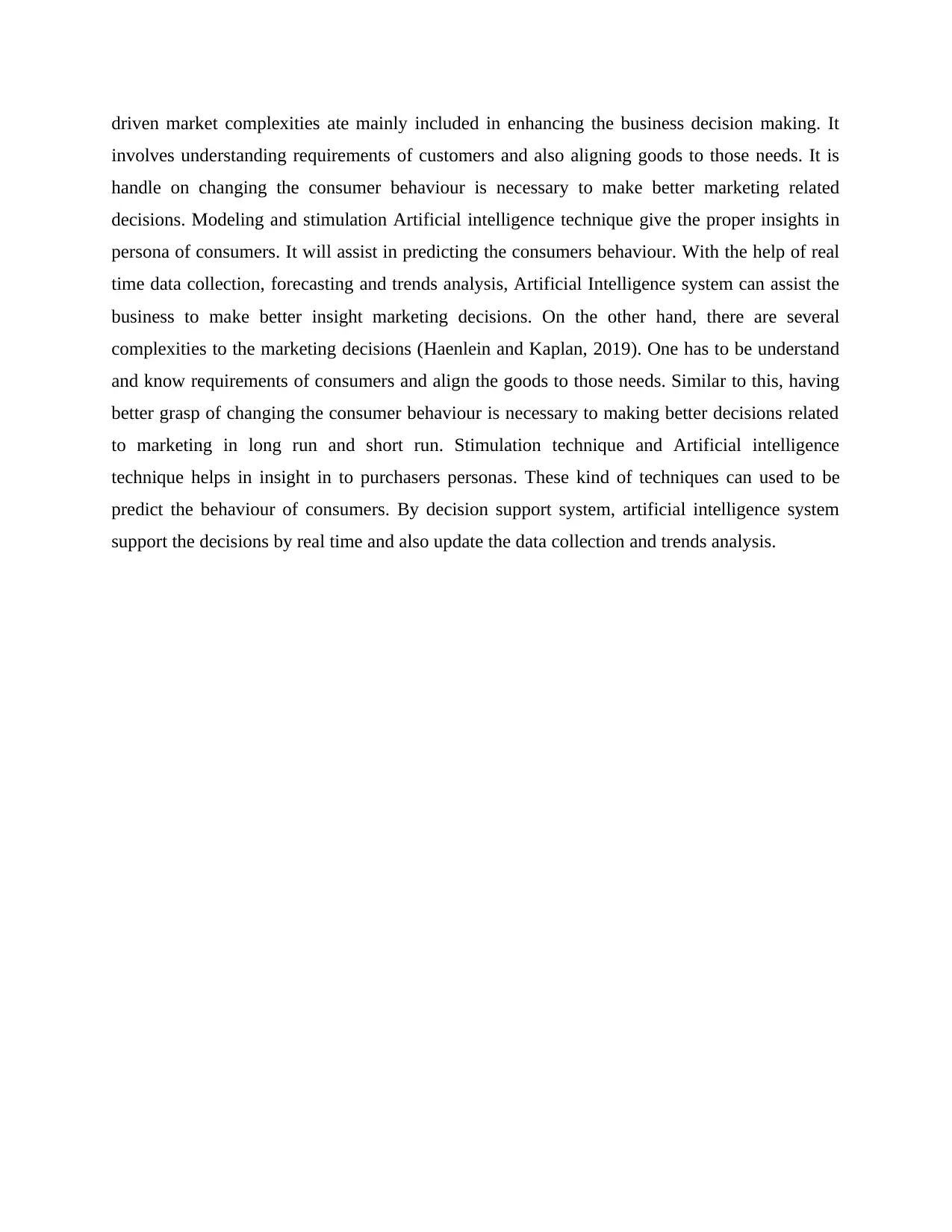
driven market complexities ate mainly included in enhancing the business decision making. It
involves understanding requirements of customers and also aligning goods to those needs. It is
handle on changing the consumer behaviour is necessary to make better marketing related
decisions. Modeling and stimulation Artificial intelligence technique give the proper insights in
persona of consumers. It will assist in predicting the consumers behaviour. With the help of real
time data collection, forecasting and trends analysis, Artificial Intelligence system can assist the
business to make better insight marketing decisions. On the other hand, there are several
complexities to the marketing decisions (Haenlein and Kaplan, 2019). One has to be understand
and know requirements of consumers and align the goods to those needs. Similar to this, having
better grasp of changing the consumer behaviour is necessary to making better decisions related
to marketing in long run and short run. Stimulation technique and Artificial intelligence
technique helps in insight in to purchasers personas. These kind of techniques can used to be
predict the behaviour of consumers. By decision support system, artificial intelligence system
support the decisions by real time and also update the data collection and trends analysis.
involves understanding requirements of customers and also aligning goods to those needs. It is
handle on changing the consumer behaviour is necessary to make better marketing related
decisions. Modeling and stimulation Artificial intelligence technique give the proper insights in
persona of consumers. It will assist in predicting the consumers behaviour. With the help of real
time data collection, forecasting and trends analysis, Artificial Intelligence system can assist the
business to make better insight marketing decisions. On the other hand, there are several
complexities to the marketing decisions (Haenlein and Kaplan, 2019). One has to be understand
and know requirements of consumers and align the goods to those needs. Similar to this, having
better grasp of changing the consumer behaviour is necessary to making better decisions related
to marketing in long run and short run. Stimulation technique and Artificial intelligence
technique helps in insight in to purchasers personas. These kind of techniques can used to be
predict the behaviour of consumers. By decision support system, artificial intelligence system
support the decisions by real time and also update the data collection and trends analysis.
Paraphrase This Document
Need a fresh take? Get an instant paraphrase of this document with our AI Paraphraser
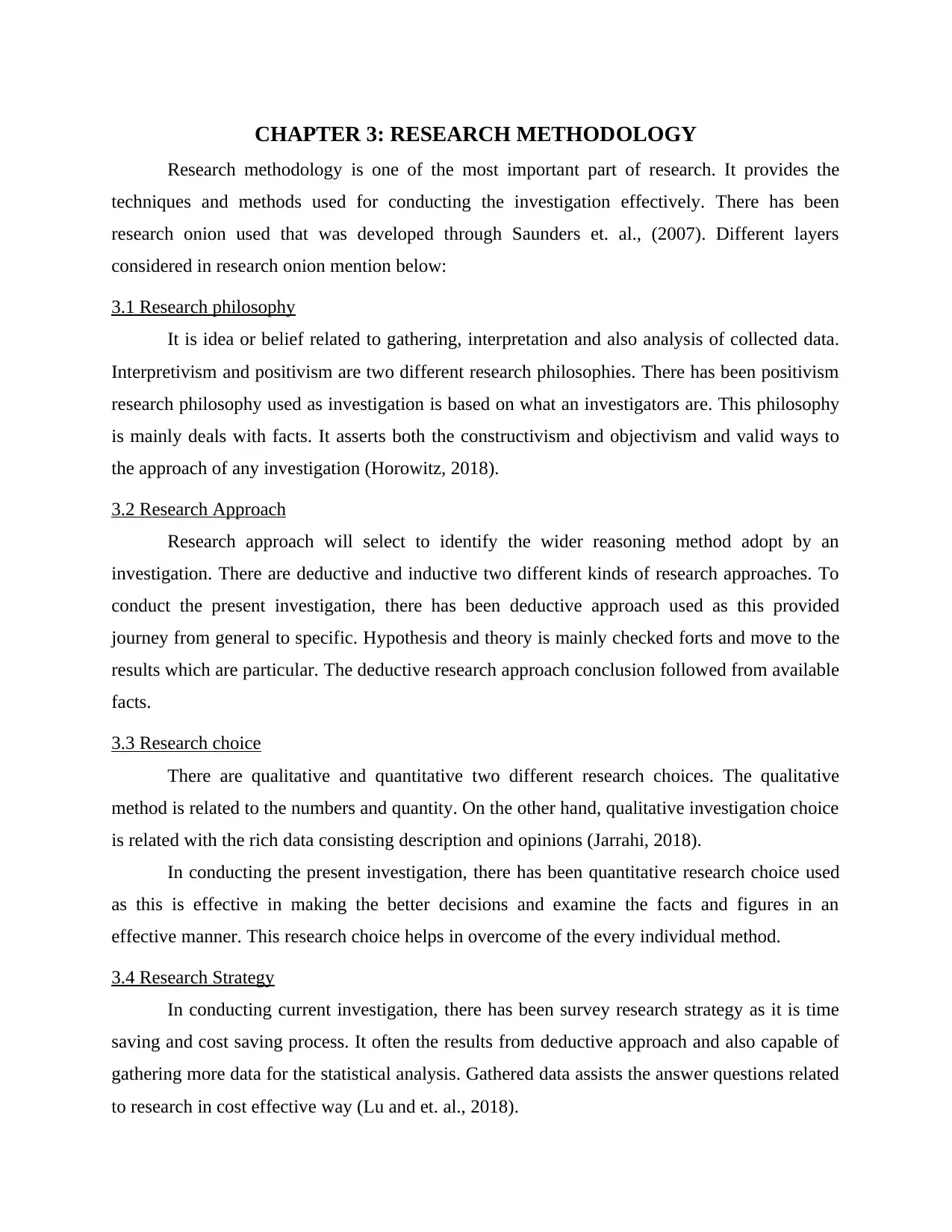
CHAPTER 3: RESEARCH METHODOLOGY
Research methodology is one of the most important part of research. It provides the
techniques and methods used for conducting the investigation effectively. There has been
research onion used that was developed through Saunders et. al., (2007). Different layers
considered in research onion mention below:
3.1 Research philosophy
It is idea or belief related to gathering, interpretation and also analysis of collected data.
Interpretivism and positivism are two different research philosophies. There has been positivism
research philosophy used as investigation is based on what an investigators are. This philosophy
is mainly deals with facts. It asserts both the constructivism and objectivism and valid ways to
the approach of any investigation (Horowitz, 2018).
3.2 Research Approach
Research approach will select to identify the wider reasoning method adopt by an
investigation. There are deductive and inductive two different kinds of research approaches. To
conduct the present investigation, there has been deductive approach used as this provided
journey from general to specific. Hypothesis and theory is mainly checked forts and move to the
results which are particular. The deductive research approach conclusion followed from available
facts.
3.3 Research choice
There are qualitative and quantitative two different research choices. The qualitative
method is related to the numbers and quantity. On the other hand, qualitative investigation choice
is related with the rich data consisting description and opinions (Jarrahi, 2018).
In conducting the present investigation, there has been quantitative research choice used
as this is effective in making the better decisions and examine the facts and figures in an
effective manner. This research choice helps in overcome of the every individual method.
3.4 Research Strategy
In conducting current investigation, there has been survey research strategy as it is time
saving and cost saving process. It often the results from deductive approach and also capable of
gathering more data for the statistical analysis. Gathered data assists the answer questions related
to research in cost effective way (Lu and et. al., 2018).
Research methodology is one of the most important part of research. It provides the
techniques and methods used for conducting the investigation effectively. There has been
research onion used that was developed through Saunders et. al., (2007). Different layers
considered in research onion mention below:
3.1 Research philosophy
It is idea or belief related to gathering, interpretation and also analysis of collected data.
Interpretivism and positivism are two different research philosophies. There has been positivism
research philosophy used as investigation is based on what an investigators are. This philosophy
is mainly deals with facts. It asserts both the constructivism and objectivism and valid ways to
the approach of any investigation (Horowitz, 2018).
3.2 Research Approach
Research approach will select to identify the wider reasoning method adopt by an
investigation. There are deductive and inductive two different kinds of research approaches. To
conduct the present investigation, there has been deductive approach used as this provided
journey from general to specific. Hypothesis and theory is mainly checked forts and move to the
results which are particular. The deductive research approach conclusion followed from available
facts.
3.3 Research choice
There are qualitative and quantitative two different research choices. The qualitative
method is related to the numbers and quantity. On the other hand, qualitative investigation choice
is related with the rich data consisting description and opinions (Jarrahi, 2018).
In conducting the present investigation, there has been quantitative research choice used
as this is effective in making the better decisions and examine the facts and figures in an
effective manner. This research choice helps in overcome of the every individual method.
3.4 Research Strategy
In conducting current investigation, there has been survey research strategy as it is time
saving and cost saving process. It often the results from deductive approach and also capable of
gathering more data for the statistical analysis. Gathered data assists the answer questions related
to research in cost effective way (Lu and et. al., 2018).
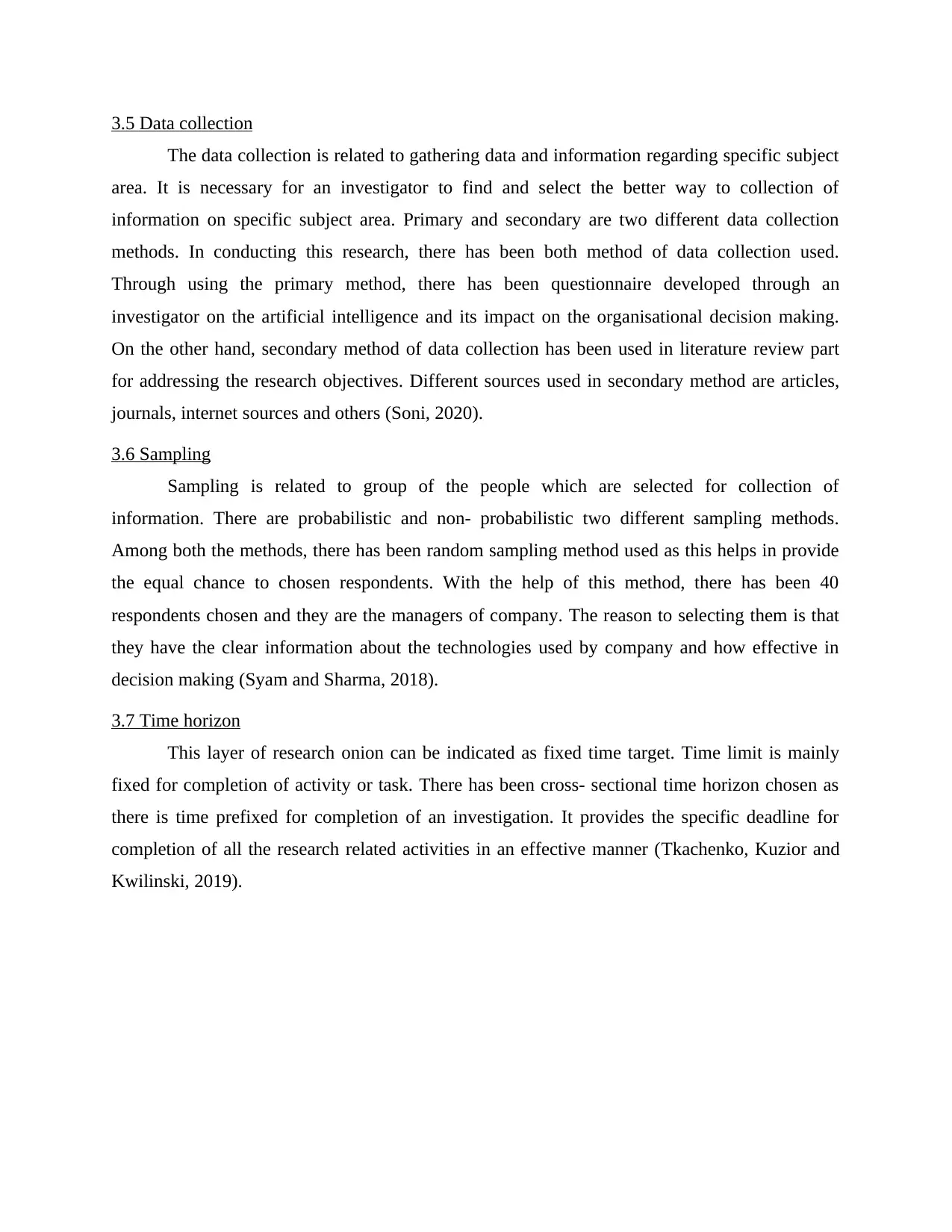
3.5 Data collection
The data collection is related to gathering data and information regarding specific subject
area. It is necessary for an investigator to find and select the better way to collection of
information on specific subject area. Primary and secondary are two different data collection
methods. In conducting this research, there has been both method of data collection used.
Through using the primary method, there has been questionnaire developed through an
investigator on the artificial intelligence and its impact on the organisational decision making.
On the other hand, secondary method of data collection has been used in literature review part
for addressing the research objectives. Different sources used in secondary method are articles,
journals, internet sources and others (Soni, 2020).
3.6 Sampling
Sampling is related to group of the people which are selected for collection of
information. There are probabilistic and non- probabilistic two different sampling methods.
Among both the methods, there has been random sampling method used as this helps in provide
the equal chance to chosen respondents. With the help of this method, there has been 40
respondents chosen and they are the managers of company. The reason to selecting them is that
they have the clear information about the technologies used by company and how effective in
decision making (Syam and Sharma, 2018).
3.7 Time horizon
This layer of research onion can be indicated as fixed time target. Time limit is mainly
fixed for completion of activity or task. There has been cross- sectional time horizon chosen as
there is time prefixed for completion of an investigation. It provides the specific deadline for
completion of all the research related activities in an effective manner (Tkachenko, Kuzior and
Kwilinski, 2019).
The data collection is related to gathering data and information regarding specific subject
area. It is necessary for an investigator to find and select the better way to collection of
information on specific subject area. Primary and secondary are two different data collection
methods. In conducting this research, there has been both method of data collection used.
Through using the primary method, there has been questionnaire developed through an
investigator on the artificial intelligence and its impact on the organisational decision making.
On the other hand, secondary method of data collection has been used in literature review part
for addressing the research objectives. Different sources used in secondary method are articles,
journals, internet sources and others (Soni, 2020).
3.6 Sampling
Sampling is related to group of the people which are selected for collection of
information. There are probabilistic and non- probabilistic two different sampling methods.
Among both the methods, there has been random sampling method used as this helps in provide
the equal chance to chosen respondents. With the help of this method, there has been 40
respondents chosen and they are the managers of company. The reason to selecting them is that
they have the clear information about the technologies used by company and how effective in
decision making (Syam and Sharma, 2018).
3.7 Time horizon
This layer of research onion can be indicated as fixed time target. Time limit is mainly
fixed for completion of activity or task. There has been cross- sectional time horizon chosen as
there is time prefixed for completion of an investigation. It provides the specific deadline for
completion of all the research related activities in an effective manner (Tkachenko, Kuzior and
Kwilinski, 2019).
⊘ This is a preview!⊘
Do you want full access?
Subscribe today to unlock all pages.

Trusted by 1+ million students worldwide
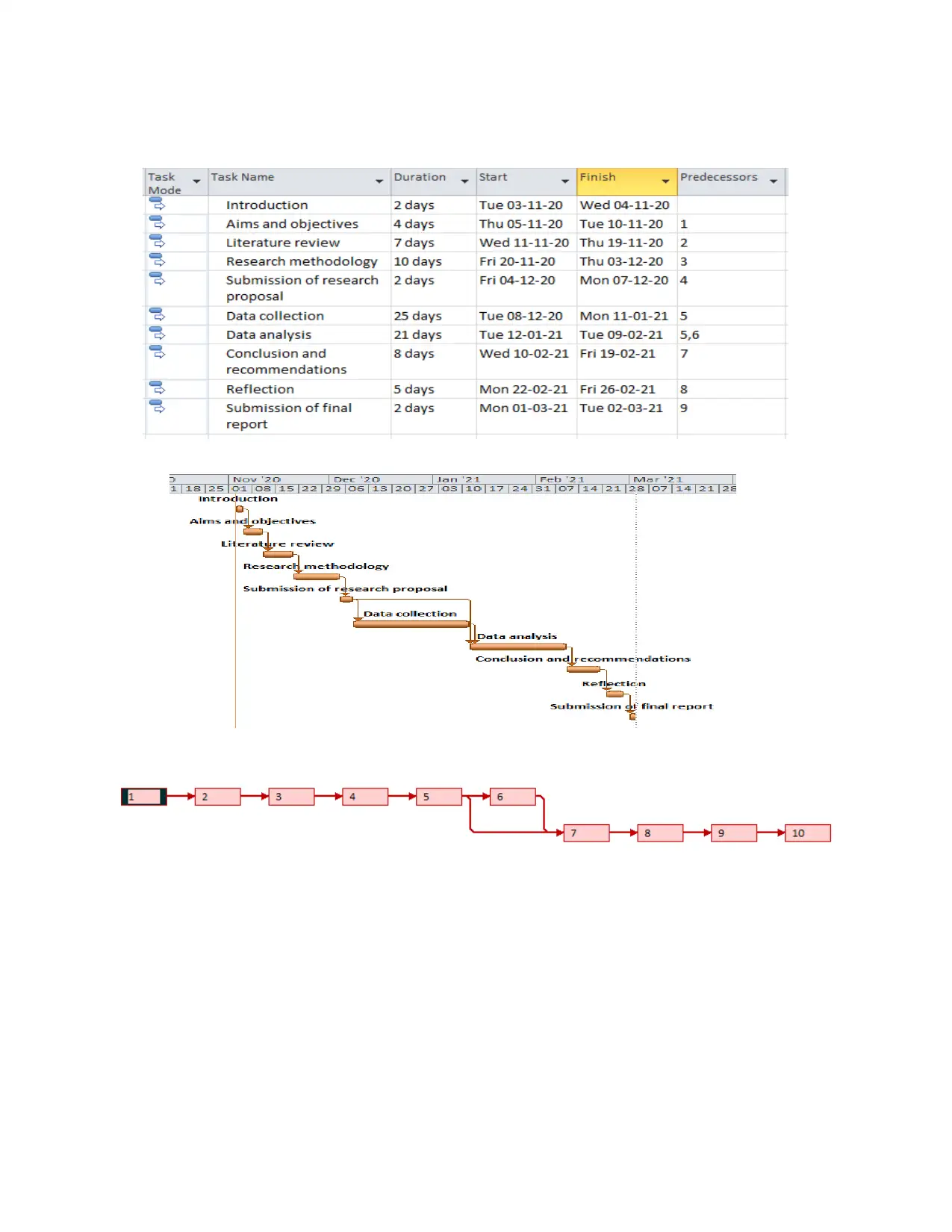
Paraphrase This Document
Need a fresh take? Get an instant paraphrase of this document with our AI Paraphraser
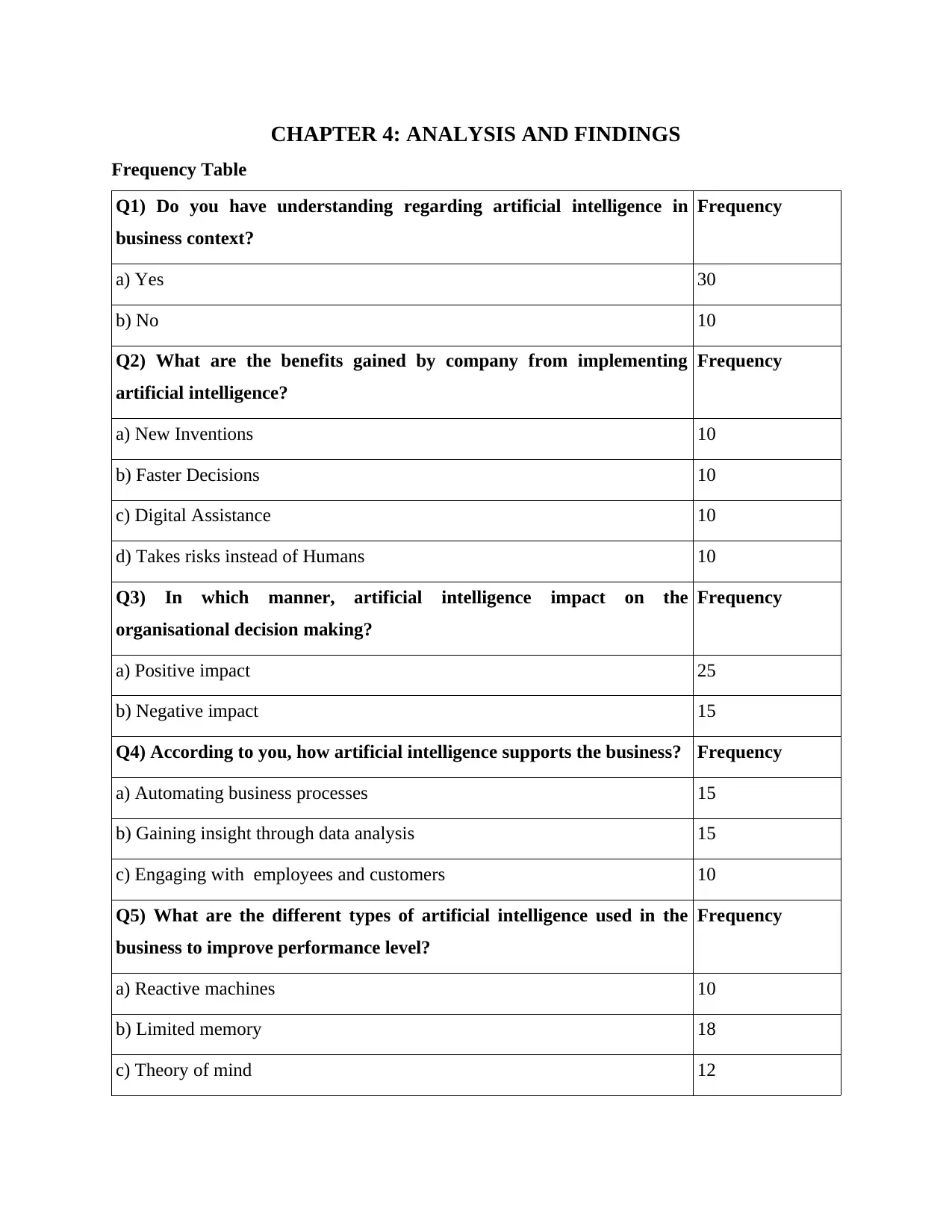
CHAPTER 4: ANALYSIS AND FINDINGS
Frequency Table
Q1) Do you have understanding regarding artificial intelligence in
business context?
Frequency
a) Yes 30
b) No 10
Q2) What are the benefits gained by company from implementing
artificial intelligence?
Frequency
a) New Inventions 10
b) Faster Decisions 10
c) Digital Assistance 10
d) Takes risks instead of Humans 10
Q3) In which manner, artificial intelligence impact on the
organisational decision making?
Frequency
a) Positive impact 25
b) Negative impact 15
Q4) According to you, how artificial intelligence supports the business? Frequency
a) Automating business processes 15
b) Gaining insight through data analysis 15
c) Engaging with employees and customers 10
Q5) What are the different types of artificial intelligence used in the
business to improve performance level?
Frequency
a) Reactive machines 10
b) Limited memory 18
c) Theory of mind 12
Frequency Table
Q1) Do you have understanding regarding artificial intelligence in
business context?
Frequency
a) Yes 30
b) No 10
Q2) What are the benefits gained by company from implementing
artificial intelligence?
Frequency
a) New Inventions 10
b) Faster Decisions 10
c) Digital Assistance 10
d) Takes risks instead of Humans 10
Q3) In which manner, artificial intelligence impact on the
organisational decision making?
Frequency
a) Positive impact 25
b) Negative impact 15
Q4) According to you, how artificial intelligence supports the business? Frequency
a) Automating business processes 15
b) Gaining insight through data analysis 15
c) Engaging with employees and customers 10
Q5) What are the different types of artificial intelligence used in the
business to improve performance level?
Frequency
a) Reactive machines 10
b) Limited memory 18
c) Theory of mind 12
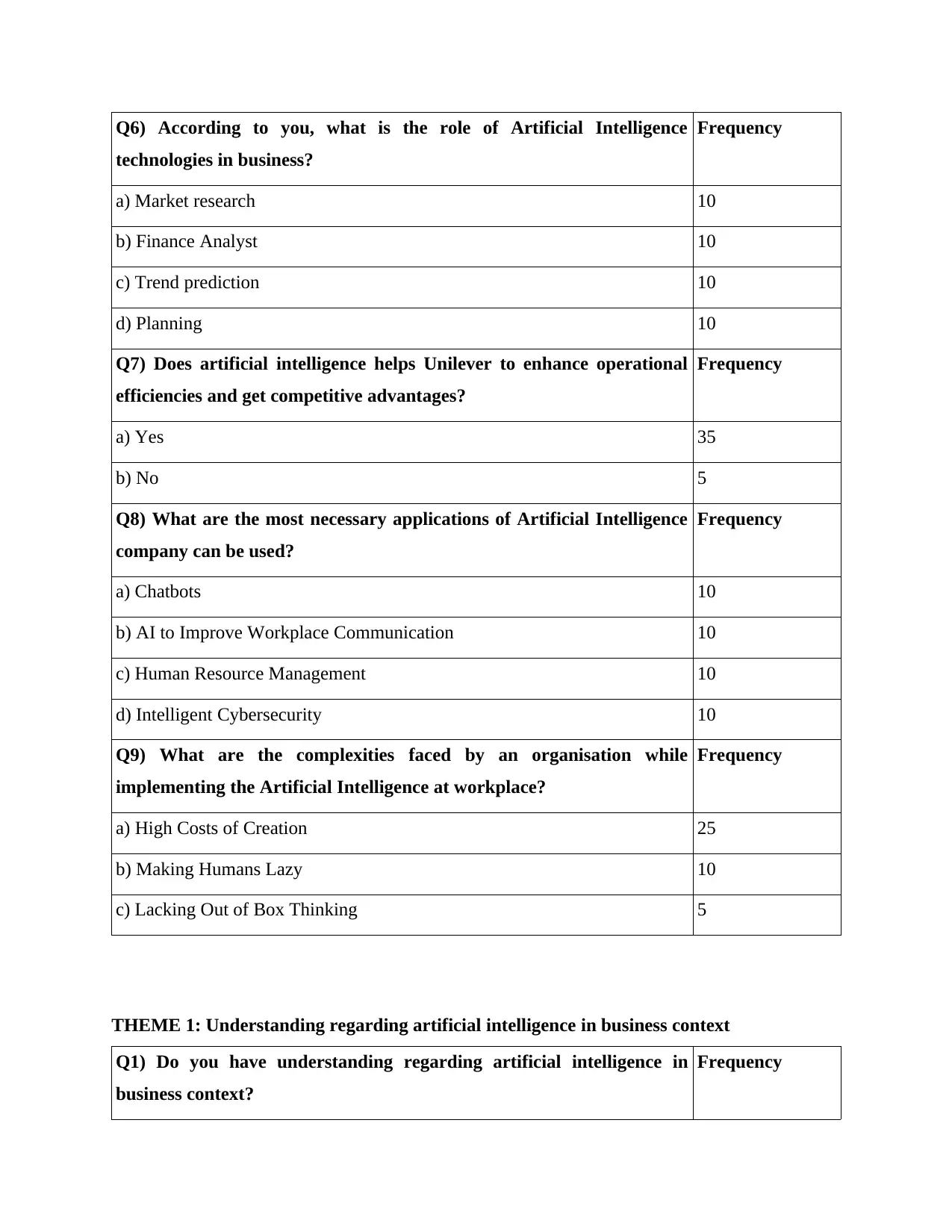
Q6) According to you, what is the role of Artificial Intelligence
technologies in business?
Frequency
a) Market research 10
b) Finance Analyst 10
c) Trend prediction 10
d) Planning 10
Q7) Does artificial intelligence helps Unilever to enhance operational
efficiencies and get competitive advantages?
Frequency
a) Yes 35
b) No 5
Q8) What are the most necessary applications of Artificial Intelligence
company can be used?
Frequency
a) Chatbots 10
b) AI to Improve Workplace Communication 10
c) Human Resource Management 10
d) Intelligent Cybersecurity 10
Q9) What are the complexities faced by an organisation while
implementing the Artificial Intelligence at workplace?
Frequency
a) High Costs of Creation 25
b) Making Humans Lazy 10
c) Lacking Out of Box Thinking 5
THEME 1: Understanding regarding artificial intelligence in business context
Q1) Do you have understanding regarding artificial intelligence in
business context?
Frequency
technologies in business?
Frequency
a) Market research 10
b) Finance Analyst 10
c) Trend prediction 10
d) Planning 10
Q7) Does artificial intelligence helps Unilever to enhance operational
efficiencies and get competitive advantages?
Frequency
a) Yes 35
b) No 5
Q8) What are the most necessary applications of Artificial Intelligence
company can be used?
Frequency
a) Chatbots 10
b) AI to Improve Workplace Communication 10
c) Human Resource Management 10
d) Intelligent Cybersecurity 10
Q9) What are the complexities faced by an organisation while
implementing the Artificial Intelligence at workplace?
Frequency
a) High Costs of Creation 25
b) Making Humans Lazy 10
c) Lacking Out of Box Thinking 5
THEME 1: Understanding regarding artificial intelligence in business context
Q1) Do you have understanding regarding artificial intelligence in
business context?
Frequency
⊘ This is a preview!⊘
Do you want full access?
Subscribe today to unlock all pages.

Trusted by 1+ million students worldwide
1 out of 27
Related Documents
Your All-in-One AI-Powered Toolkit for Academic Success.
+13062052269
info@desklib.com
Available 24*7 on WhatsApp / Email
![[object Object]](/_next/static/media/star-bottom.7253800d.svg)
Unlock your academic potential
Copyright © 2020–2026 A2Z Services. All Rights Reserved. Developed and managed by ZUCOL.





